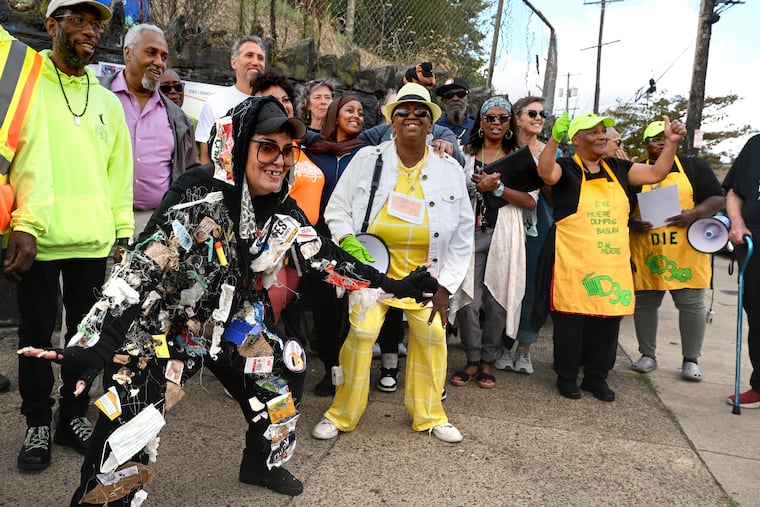Philly advocates host ‘trash party’ to cast light on illegal dumping sites
Community advocates called on Mayor Cherelle L. Parker to halt illegal dumping by 2028.

Marilyn Rodriguez’s character, Trash Monster, was the real star of the party as she floated around guests, blithely ignoring humorous ribbings of “go away” and “adiós basura.” But she was highlighting a serious issue: the stubbornness of the city’s illegal dumping problem.
Hosting what was called an “ironic birthday party,” Clean Philadelphia NOW, a new citywide coalition of antidumping advocates, rallied in Fairhill on Thursday to urge Mayor Cherelle L. Parker to expand her signature Clean and Green initiative to end illegal dumping by 2028.
The group had gathered at Sixth and Somerset Streets, the location of the shuttered Fairhill School, which has become one of 24 legacy dump sites — locations the coalition has identified in the 19140 zip code as consistently used for dumping waste.
“The Fairhill school closed in 2013, and not long after that the illegal dumping started,” said Trash Academy co-director Teea Tynes. She said she was optimistic the problem was solved when the area was cleaned in 2022, but the dumping just continued.
The ongoing problem of illegal dumping
While Parker declared her summerlong citywide cleanup effort of 18,000 blocks a success, Clean Philadelphia NOW insisted that cleaning was a temporary solution. “Cleaning is not enough. You have to enforce,” said Lois Williams, co-director of Trash Academy, which is helping to organize Clean Philadelphia NOW.
During the 1950s, Philadelphia was a national role model for municipal cleanliness, but by 2020 Forbes ranked it as the dirtiest city in the country. Community cleanups, 911 reports of lawbreakers, the purchase of Big Belly trash cans, and 311 service requests have been incapable of halting illegal dumping or the creation of legacy trash sites.
When Ramona Rousseau-Reid, vice president of the Eastwick Friends & Neighbors Coalition, moved into Eastwick 35 years ago, she said she was charmed by the verdant, clean, suburban-like setting. Over time, she would see a filthier tale emerge as people used the forested, isolated areas as dumping grounds, especially for abandoned cars and construction and demolition waste.
However, there were signs of problems even in Philadelphia’s cleanest days. Reid said during a recent research trip she learned the Eastwick community, which was built on a landfill, was protesting trash and dumping as early as the 1950s. “It’s unbelievable. It’s a long-term problem.”
A need for new solutions
A 2019 study estimated Philadelphia spends $48.4 million annually on litter and illegal dumping cleanup, prevention, and abatement.
According to Shari Hersh, a co-director of Trash Academy, the lack of an affordable, convenient legal dumping site for small haulers, often entrepreneurs who do small renovation and demolition projects, is a major problem. Currently, none of the city’s six sanitation convenience centers, which accept residents’ oversized trash, yard waste, and recycling, accept small loads of construction waste.
Hersh said reconfiguring at least one of city centers to accept small loads would not only decrease illegal dumping but encourage upcycling to keep waste out of landfills. With a legitimate option, Hersh said, “you create a doable bar.”
Zero tolerance for dumping
Clean Philadelphia NOW also called for better prevention and education efforts as well as implementing a zero-tolerance approach for those who break the law.
Carlton Williams, director of the Office of Clean and Green, said the city has prosecuted over 26 cases of illegal dumpers so far this year, leading to $1.4 million in fines.
Maurice Sampson, Eastern Pennsylvania director for Clean Water Action, one of the organizers of the campaign, called illegal dumping “morally offensive.”
“We don’t accept our neighborhoods are free dump sites,” he said.
In addition to legitimizing small haulers, he said, there should a strong approach to enforcement.
“Go after them, take their trucks, and end the legacy dumping cycle forever.”